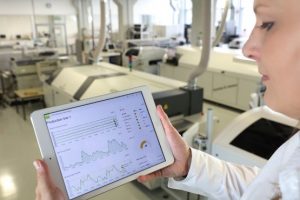Artificial Intelligence and Machine Learning
Definition
 In the course of digitalization, interconnected plants and intelligent products are generating ever-increasing amounts of data. Artificial intelligence methods, especially machine learning, make it possible to analyze this data profitably and generate knowledge from it. This knowledge, in turn, must be represented and linked in such a way that existing data silos can be broken down, end-to-end data integration can be established, and user-friendly applications can be realized.
In the course of digitalization, interconnected plants and intelligent products are generating ever-increasing amounts of data. Artificial intelligence methods, especially machine learning, make it possible to analyze this data profitably and generate knowledge from it. This knowledge, in turn, must be represented and linked in such a way that existing data silos can be broken down, end-to-end data integration can be established, and user-friendly applications can be realized.
Vision
The technology field supports industry in identifying and exploiting the various potentials of AI, especially machine learning. Furthermore, it serves the knowledge transfer within the institute.
Focus areas
- Data management and databases (e.g., SQL, NoSQL)
- Edge cloud architectures and machine learning operations (MLOps)
- Data pre-processing (e.g., feature engineering) and explorative data analysis using statistical methods
- Machine learning, deep learning (e.g., convolutional neural networks, transformers), and reinforcement learning
- Generative AI (e.g., large language models such as ChatGPT, generative adversarial networks)
- Knowledge graphs based on semantic web technologies
Application Fields
- AI applications in the Industry 4.0 environment (e.g., automatic visual inspection, predictive maintenance, process monitoring, process control, process optimization)
- Knowledge-based assistance systems in engineering (e.g., constraint-based configurators, knowledge graphs)
- AI systems in medical technology applications (e.g., environment segmentation for visually impaired people)
Head of Technology Field
Members
- Marcel Baader, M.Sc.
- Helmut Engelhardt, M.Sc.
- Jan Fröhlich, M.Sc.
- Simon Fröhlig, M.Sc.
- Gabriela García, M.Sc.
- Andreas Gründer, M.Sc.
- Benjamin Gutwald, M.Sc.
- Annalena Hartmann, M.Sc.
- Bernd Hofmann, M.Sc.
- Lucas Janisch, M.Sc.
- Oguz Kedilioglu, M.Sc.
- Christoph Konrad, M.Sc.
- Felix Mahr, M.Sc.
- Sven Meier, M.Sc., M.Sc.
- Andreas Morello, M.Sc.
- Alexander Müller, M.Sc.
- Huong Giang Nguyen, M.Sc.
- Daniela Pisanu, M.Sc.
- Anja Preitschaft, M.Sc.
- Ben Rachinger, M.Sc.
- Tim Raffin, M.Sc.
- Tobias Reichenstein, M.Sc.
- Albert Scheck, M.Sc.
- Benedikt Scheffler, M.Sc.
- Simon Schlichte, M.Sc.
- Elisabeth Schmidl, M.Eng.
- Alexander Schneider, M.Sc.
- Dr. Reinhardt Seidel, M.Sc.
- Till Sindel, M.Sc.
- Oliver Stelter, M.Sc.
- Dipl.-Ing. Ludwig Streloke
- Nils Thielen, M.Sc.
- Jann Warnecke, M.Sc.
- Patrick Ziegler, M.Sc.
